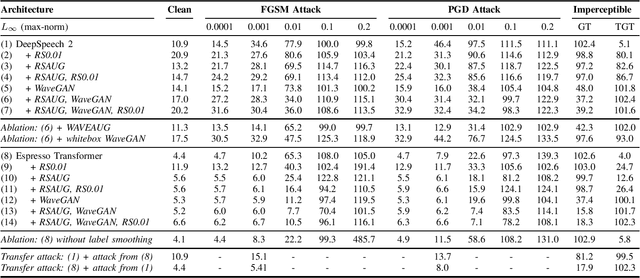Adversarial Attacks and Defenses for Speech Recognition Systems
Paper and Code
Mar 31, 2021
The ubiquitous presence of machine learning systems in our lives necessitates research into their vulnerabilities and appropriate countermeasures. In particular, we investigate the effectiveness of adversarial attacks and defenses against automatic speech recognition (ASR) systems. We select two ASR models - a thoroughly studied DeepSpeech model and a more recent Espresso framework Transformer encoder-decoder model. We investigate two threat models: a denial-of-service scenario where fast gradient-sign method (FGSM) or weak projected gradient descent (PGD) attacks are used to degrade the model's word error rate (WER); and a targeted scenario where a more potent imperceptible attack forces the system to recognize a specific phrase. We find that the attack transferability across the investigated ASR systems is limited. To defend the model, we use two preprocessing defenses: randomized smoothing and WaveGAN-based vocoder, and find that they significantly improve the model's adversarial robustness. We show that a WaveGAN vocoder can be a useful countermeasure to adversarial attacks on ASR systems - even when it is jointly attacked with the ASR, the target phrases' word error rate is high.
 Add to Chrome
Add to Chrome Add to Firefox
Add to Firefox Add to Edge
Add to Edge